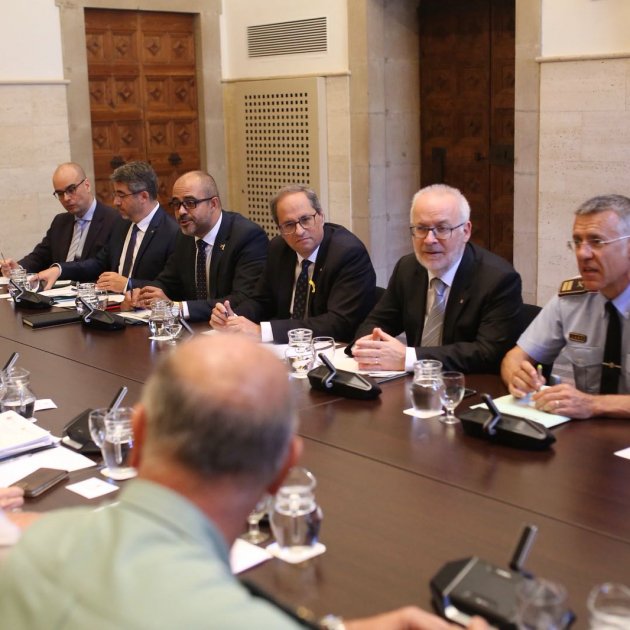Within a month, the Mossos d'Esquadra, the Catalan police, will join CITCO, the Intelligence Centre for Counter-Terrorism and Organised Crime, an old demand from the Catalan interior ministry. The agreement was one of the results of today's meeting of the security board, which lasted two hours.
It was agreed in today's meeting that the Mossos will have a permanent representative at the centre. The systems for information exchange will be prepared this month, being currently incompatible on a technical level.
A police co-ordination commission is being created to work "nimbly" between board meetings, Catalan interior minister Miquel Buch said.
Buch thanked his Spanish counterpart and the team with him at the security board: "It was very clear that the collaboration in terms of security is a real collaboration. There are no differences of political stripes. We're united by the loyal joint work between two administrations and various police forces".
Spanish interior minister Fernando Grande-Marlaska took a similar line: "It's a clear and obvious demonstration of the desire and commitment for institutional cooperation and loyalty and it has a clear aim, which is to guarantee that the public can exercise its rights and freedoms".
Yellow loops
"Public spaces belong to all citizens and all ideologies. A meeting place," said Grande-Marlaska. The topic of symbols like yellow loops in the streets and whether or not they should be removed was the first one discussed in today's meeting.
"Social harmony is a real concern", said the minister, for which he believes it's necessary to "establish the guarantee of a space in which everyone can exercise their rights and freedoms without monopolies". He said that there's a "commitment to give help and collaboration in everything [the Mossos] might need" through an agreement based on "institutional trust, commitment and loyalty with the inherent responsibilities".
Responsibility for public order in Catalonia is up to the Mossos, and Grande-Marlaska says it will remain that way: "We political representatives aren't here to create problems. [Public] spaces have to be for meeting and not monopolised by anyone".
"I want a space free of threats and violence," said the minister. "There's a commitment to guarantee that the public space is for all citizens" and to "work for neutrality", he concluded.
Buch said that his ministry "doesn't believe there's a problem with social harmony" and emphasised that they're working hard on mediation to solve the conflict. "Let's not fall into provocations," he said and called for no one to amplify those seeking confrontation.
Neither of the two, however, explained what steps will be taken to guarantee "the neutrality of public spaces".
Spanish riot police
Grande-Marlaska explained the decision to send 600 riot police to Catalonia, reducing its importance: "the aim is normal".
The minister insisted the deployment was unexceptional: "It's not at all extraordinary, nor exceptional. A Champions League final leads to 2,000 officers being moved. There's no need to be alarmist when there's no need for alarm. They are proportional to the current need and will have the roles of protecting public buildings and a precaution so that in case the Mossos, in a hypothetical possibility, should call for our cooperation, we have the appropriate personnel".
More Mossos
In the meeting, the Catalan side also asked for two more intakes of Mossos cadets before 2021, 750 in each. Added to the new class which started at the Public Safety Institute on Monday, that would give 2000 more officers, meeting the total agreed upon with the Spanish state of 18,000 officers in the force.
The request now, however, has to go through the filter of the economy and treasury ministries, the ones with the power to authorise it.
The meeting was attended by the senior technical and political leadership of the Spanish and Catalan interior ministries. The previous one was held in July 2017 when Jordi Jané was Catalan interior minister and Juan Ignacio Zoido his Spanish counterpart.
